
Connectivity focuses on all things related to diversity, equity, and inclusion (DEI) across Pennsylvania’s State System of Higher Education. The publication will highlight thought leaders, promising initiatives, and other actions that promote diverse, equitable, and inclusive policies and higher education practices across the Commonwealth and beyond. Connectivity will be informative, inclusive, thought-provoking, and focused.
Content Editor
Greetings PASSHE Community!
There’s a lot of wonderful work underway across the State System. The Office of Diversity,
Equity, and Inclusion is excited to continue its partnership with campus leaders,
students, and others to elevate the State System as the best public system of higher
education in the nation.
#Together4PASSHE
Lunar New Year
Happy Chinese New Year and welcome to the Year of the Tiger! February 1st was the
Lunar New Year, an important day on the lunisolar calendar marking the rise of the
second new moon after the winter solstice. Spring is coming!
Black History Month
Black History Month is an annual celebration of achievements by African Americans
and a time for recognizing their central role in U.S. history. Also known as African
American History Month, the event grew out of “Negro History Week,” the brainchild
of noted historian Carter G. Woodson and other prominent African Americans. Since
1976, every U.S. president has officially designated the month of February as Black
History Month. Other countries around the world, including Canada and the United Kingdom,
also devote a month to celebrating Black history. Learn more about
Black history this month and beyond – knowledge is powerful.
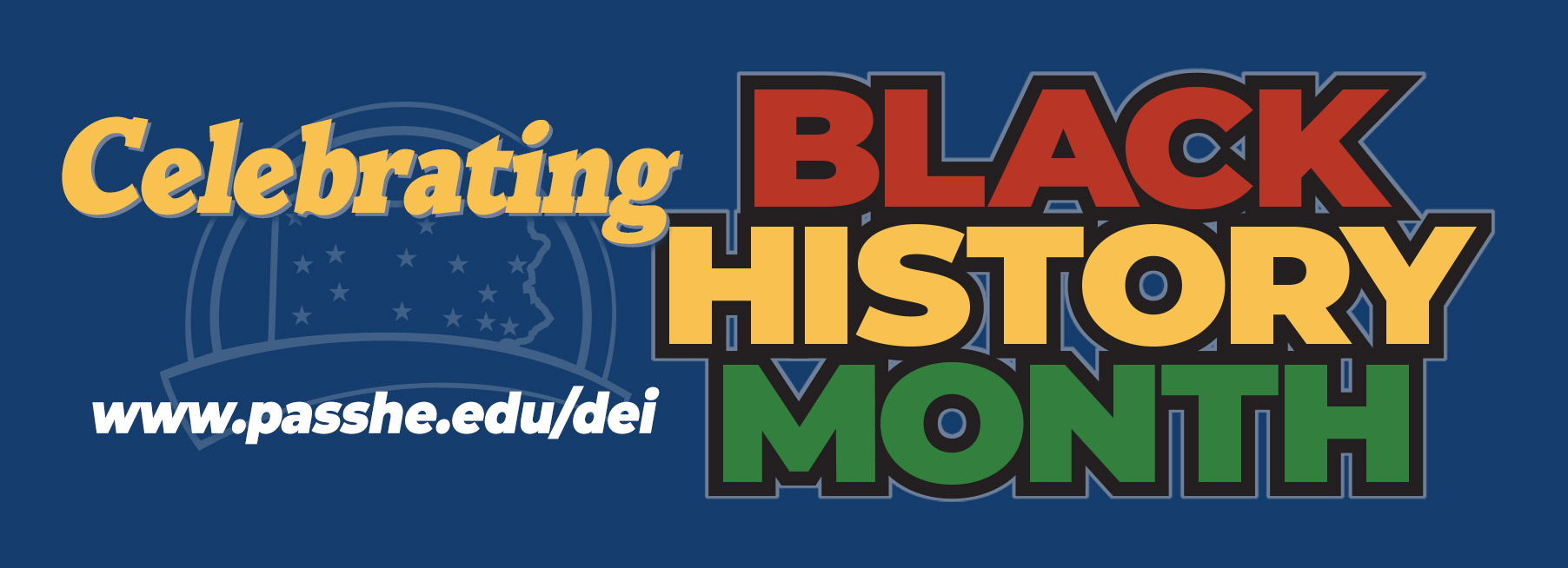
DEI Resources
The State System continues to work with stakeholders to achieve its mission-driven DEI goals. Anchored by our DEI Strategic Framework including its five strategic priorities, we are in the process of creating a catalog of DEI Resources to assist the State System and universities with their work to: 1) increase faculty, staff, and student diversity; 2) create inclusive communities; 3) improve student outcomes; 4) diversify the curriculum; and 5) create enabling infrastructures. Included with these resources is a Glossary of Commonly Used Terms. We welcome your contributions to this evolving collaborative effort. Send your feedback to dei@passhe.edu.
Frederick Douglass Institute Welcomes Dr. Joseph Croskey as Its First Executive Director
 The Office of Diversity, Equity, and Inclusion is pleased to announce the appointment
of Dr. Joseph Croskey as the inaugural Executive Director of the Frederick Douglass
Institute (FDI). This State System appointment acknowledges Frederick Douglass’ long
history with the Commonwealth. Did you know that he gave his last speech on the campus
of West Chester University, on February 1, 1895?
The Office of Diversity, Equity, and Inclusion is pleased to announce the appointment
of Dr. Joseph Croskey as the inaugural Executive Director of the Frederick Douglass
Institute (FDI). This State System appointment acknowledges Frederick Douglass’ long
history with the Commonwealth. Did you know that he gave his last speech on the campus
of West Chester University, on February 1, 1895?
We are committed to elevating the FDI in the spirit of this great statesman and social
justice advocate – ensuring that his legacy lives on through the students, faculty,
and staff who we serve throughout the State System. Please do not hesitate to reach
out to Dr. Croskey (jcroskey@clarion.edu) to share your thoughts about how the FDI can be leveraged to improve student, faculty,
and staff experiences.
In this Issue
Featured Stories
- State System Systemwide Climate Survey: A Systemwide Effort to Cultivate Inclusive Communities
- Celebrating Black History Month: Podcast Recommendation: “1619”
- 2022 PASSHE Diversity, Equity, and Inclusion Summit: We want your input!
- Do you have the right game plan? Athletics success is built with DEI goals
- Access and Inclusivity: Disability Representation in DEI Initiatives
Featured Stories
State System Systemwide Climate Survey: A Systemwide Effort to Cultivate Inclusive Communities
On January 31, 2022, the State System launched its first ever Systemwide Climate Survey. The survey was distributed to all students and employees at the State System’s 14 universities and the System Office who were enrolled or employed as of January 5, 2022. More than 70,000 students and 10,000 employees across the State System now have an opportunity to share their voices and experiences until March 4, 2022. Check your university email for the survey link from Viewfinder Campus Climate Surveys, our third-party survey vendor.
The Systemwide Climate Survey is part of the State System’s initiatives that are grounded in the Diversity, Equity, and Inclusion (DEI) Strategy Framework, a set of five strategic priorities that were affirmed by the Board of Governors in April 2021.
The third strategic priority and a key focus of this survey is cultivating inclusive communities. The Systemwide Climate Survey will assess how different individuals and groups experience various environments at their universities. As a result, the Systemwide Climate Survey will help us understand how universities and the State System are currently promoting diverse, equitable, and inclusive environments and where the opportunities for improvement lie. This data will inform future collaborations and initiatives that aim to create inclusive and equitable environments that support all students and employees.
Launching this survey would not have been possible without the engagement and work of many people across the State System. It required months of collaboration and consultation to ensure that the survey content is useful to all universities and that the survey roll out is effective. One key partnership has been with Chief Diversity Officers (CDOs) at each university. CDOs have spearheaded campus discussions and promotions of the survey. Their leadership and insights have been indispensable.
Climate Survey Planning and Implementation Committee:
- Sheleta Camarda-Webb (Co-chair) - Chief Diversity Officer at California, Clarion and Edinboro Universities
- Natalie Cartwright (Co-chair) - Assistant Director/Senior Research Analyst in Advanced Data & Analytics, Office of the Chancellor
- Nichole Book - Circulation Supervisor Library/Information Resources, Mansfield University
- Melanie Duncan - Associate Professor & Assistant Diversity and Inclusion Officer/Deputy Title IX Coordinator, Indiana University
- Jennifer Hoover - Director of Governmental Relations, Office of the Chancellor
- Brian Mbuu - Assistant Vice Chancellor for Labor Relations, Office of the Chancellor
- Terrence Mitchell - Vice President for Diversity, Equity, and Inclusion, California, Clarion and Edinboro Universities
- Brenda Mundell - Interim Director of HR Shared Services, Office of the Chancellor
- Ursula Payne - Professor & Director of Frederick Douglass Institute, Slippery Rock University
Thank you again to everyone who has contributed to the survey launch!
Celebrating Black History Month: Podcast Recommendation: “1619”
As we continue the celebration of Black History Month and promote the study of all the diverse groups who live across the U.S. throughout the year, the Office of DEI recommends the “1619” podcast for people interested in learning more about the history and afterlife of American slavery.
“1619” is hosted by Nikole Hannah-Jones and a companion piece to The 1619 Project, an award-winning and ongoing project with contributions from many leading journalists and scholars. The project began in August 2019, the 400th anniversary of the beginning of American slavery and examines not only the origins and persistence of anti-Black racism and inequality in the U.S., but the ongoing resistance to these injustices and how Black Americans have persistently worked towards making the Constitutional values of freedom, justice, and equality for all a reality.
There are five episodes in the podcast, each with a different theme that highlights
different dimensions of Black history and the Black experience in the U.S.
- Episode 1: The Fight for a True Democracy – America was founded on the ideal of democracy. Black people fought to make it one.
- Episode 2: The Economy That Slavery Built – The institution of slavery turned a poor, fledgling nation into a financial powerhouse, and the cotton plantation was America’s first big business.
- Episode 3: The Birth of American Music – Black music, forged in captivity, became the sound of complete artistic freedom. It also became of the sound of America.
- Episode 4: How the Bad Blood Started – Black Americans were denied access to doctors and hospitals for decades. From the shadows of this exclusion, they pushed to create the nation’s first federal health care programs.
- Episode 5 (two parts): The Land of Our Fathers – More than a century and a half after the promise of 40 acres and a mule, the story of Black land ownership in America remains one of loss and dispossession.
You can listen to the first three episodes on the NYT website, and the rest on other major podcast platforms.
2022 PASSHE Diversity, Equity, and Inclusion Summit: We want your input!
The State System hosted its first Diversity, Equity, and Inclusion Summit in November 2021. More than 500 people attended the virtual conference and provided positive feedback. Now, we want your input to shape the next DEI Summit, which will be held in the fall of 2022.
The purpose for hosting this annual Summit is to bring together our State System communities to develop relationships, knowledge, and practices that support our commitment to making the State System and its universities more diverse, equitable, and inclusive for all. The belief that all students and employees should feel valued and a sense of belonging are central to the Board-affirmed Strategic Framework for DEI.
We look forward to hearing from you and seeing you at our next Summit!
Do you have the right game plan? Athletics success is built with DEI goals
By Dr. Michael McFarland, Bloomsburg University Director of Athletics, Dr. Thomas Gioglio, Lock Haven University Director of Athletics, and Peggy Carl, Mansfield University Director of Athletics
In order to get in the game, one must strive for excellence, go above and beyond what is expected, and strive for greatness. In order to improve your athletic department’s Diversity, Equity, and Inclusion plans, the game plan must be the same – strive for an excellent and welcoming environment, seek opportunities beyond the norm by pushing the limits and boundaries of what “we’ve always done,” and expect nothing but an inclusive department that allows individuals to grow and excel on all levels.
While a game plan features competitive elements that give a team the edge over an opponent, the DEI game plan should be built on similar pillars with modifications to achieve success with all elements of Diversity, Equity, and Inclusion (DEI) yet focusing on differences to improve.
A successful game plan identifies ways in which student-athletes and staff are able to leverage their strengths to lead the team to victory. When considering the implementation of a DEI plan, the strategy is no different. Everyone in the department must realize that attention to matters of diversity, equity, and inclusion is important and that this relies on everyone to make a difference. As leaders, it is imperative that each athletic department member, in order to implement a successful DEI plan, must be more attentive to social justice issues, must step up to that responsibility, and must be a willing partner in this effort.
DEI support does not just happen. The same holds true when designing a game plan. A team’s playbook is developed over time and enhanced and modified depending on the changing times and each opponent. With a DEI plan, the importance of support and the provision of the necessary tools for success are critical elements to be considered. Yet the willingness to adjust depending on the topics – whether hiring and generating a diverse pool of candidates or addressing social injustices on campus, in the community, or nationally – and ensure a certain level of flexibility in your DEI game plan, much like the athletic game plan, is what will lead to success.
According to the NCAA’s Inclusion statement (NCAA, 2021):
As a core value, the NCAA believes in and is committed to diversity, inclusion and gender equity among its student-athletes, coaches and administrators. We seek to establish and maintain an inclusive culture that fosters equitable participation for student-athletes and career opportunities for coaches and administrators from diverse backgrounds. Diversity and inclusion improve the learning environment for all student-athletes and enhance excellence within the Association.
The Office of Inclusion will provide or enable programming and education, which sustains foundations of a diverse and inclusive culture across dimensions of diversity including but not limited to age, race, sex, class, national origin, creed, educational background, religion, gender identity, disability, gender expression, geographical location, income, marital status, parental status, sexual orientation and work experiences. Adopted by the NCAA Executive Committee, April 2010; Amended by the NCAA Board of Governors, April 2017.
The NCAA’s game plan allows just that – the ability to adjust, be flexible, and lead to success while improving DEI for student-athletes and athletic departments. Part of the game plan must include buy-in from the team. How does this occur? Quite simply, that buy-in must be done in groups similar to committee structures. Teams use small-group activities to teach elements of the game plan then bring the entire group together to codify the plan. Athletic departments can utilize committees to improve their DEI game plan as well. The creation of internal support is critical to the success of the game plan. It takes a core group of “early adopters” to believe in the direction and when the entire department can get behind the DEI movement, the diversity and inclusion initiatives will grow and be successful. Additionally, when student-athletes’ voices can be unified in matters of social justice and inclusion, these results can be even more amplified. It is also important to involve those who are from diverse groups when creating committees. Without a diverse and inclusive committee structure, it will be difficult for everyone to understand the goals and what is important as the DEI game plan is designed, implemented, and adjusted.
Another part of game planning success includes collaboration with everyone on the team – involving the starters, the reserves, the coaches, and the trainers. Everyone needs to be on the same page to minimize disruptions and roadblocks to achieve success. When this happens, the game plan will demonstrate that a road to success can be accomplished. DEI planning needs to mirror this strategy and be collaborative as well. Partnering with other campus offices, when utilized strategically, can benefit the entire athletic department. For example, partnering for educational programs with offices across campus is only a starting point for moving the needle on DEI growth. It cannot be stressed enough that gaining as much education and training as possible will be the catalyst to improvement. Leading by example and sharing best practices is critical to getting faculty, staff, and student buy-in when collaborating campus-wide on DEI elements.
As simple as it may sound, designing an athletic game plan cannot just be a plan on paper, it must be an evolving outline for success. The coach cannot simply say do this and we will win; it must be practiced, viewed, presented, and encouraged. An athletic department’s DEI plan must be the same. Like a strategic plan that is designed to guide decision-making, a DEI plan must be in the forefront of a department to support change and to become a platform that encourages inclusivity and equity.
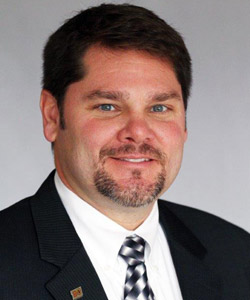 Michael McFarland, Ed.D. is the director of athletics and associate professor at Bloomsburg University, enters
his 11th year leading the Huskies athletic department and also serves as the Chair
of the Department of Athletics Faculty, as well as a three-time Mentor for the D2ADA
Minority and Women Program. In support of Diversity, Equity, and Inclusion efforts,
he spearheaded the creation of ‘Protect Our Pack,’ a student-athlete advocacy group
focused on identifying issues of bullying, racism, LGBTQA, gender, and social issues.
Michael McFarland, Ed.D. is the director of athletics and associate professor at Bloomsburg University, enters
his 11th year leading the Huskies athletic department and also serves as the Chair
of the Department of Athletics Faculty, as well as a three-time Mentor for the D2ADA
Minority and Women Program. In support of Diversity, Equity, and Inclusion efforts,
he spearheaded the creation of ‘Protect Our Pack,’ a student-athlete advocacy group
focused on identifying issues of bullying, racism, LGBTQA, gender, and social issues.
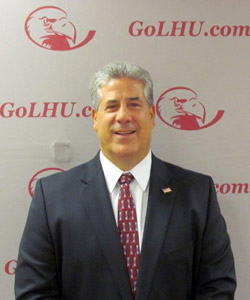 Dr. Tom Gioglio has served for 17 years as a Director of Athletics, with the last 7 years as the
Director of Athletics and Associate Professor at Lock Haven University. Since Gioglio’s
arrival, the athletic department, which sponsors 19 NCAA Division II sports and two
NCAA Division I sports, has placed a new emphasis on building a diverse, inclusive,
respectful and supportive environment to ensure all student athletes succeed academically
and athletically. Gioglio led the creation of the Social Justice Task Force, which
provides a comprehensive, community wide approach to diversity, equity and inclusion.
Dr. Tom Gioglio has served for 17 years as a Director of Athletics, with the last 7 years as the
Director of Athletics and Associate Professor at Lock Haven University. Since Gioglio’s
arrival, the athletic department, which sponsors 19 NCAA Division II sports and two
NCAA Division I sports, has placed a new emphasis on building a diverse, inclusive,
respectful and supportive environment to ensure all student athletes succeed academically
and athletically. Gioglio led the creation of the Social Justice Task Force, which
provides a comprehensive, community wide approach to diversity, equity and inclusion.
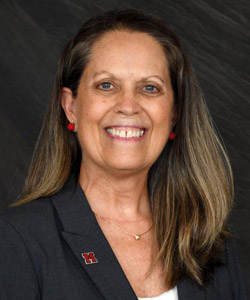 Peggy Carl is in her fourth year at the helm of the Mountaineer Athletic Department as Director
of Athletics and Assistant Professor at Mansfield University of PA, where she leads
a department of 13 intercollegiate programs, including 10 full-time coaches, a dozen
part-time coaches, and multiple administrators and faculty. In support of diversity
and inclusion efforts, Ms. Carl serves as a member of the NCAA Division II Coaching
Enhancement Grant Committee which awards funds to NCAA Division II institutions that
are “committed to enhancing ethnic minority and gender representation in newly created
assistant coaching positions for NCAA-sponsored sports.” She also serves as an awards
committee member of the Women Leaders in College Sports association as well as a mentor
to young women in the profession.
Peggy Carl is in her fourth year at the helm of the Mountaineer Athletic Department as Director
of Athletics and Assistant Professor at Mansfield University of PA, where she leads
a department of 13 intercollegiate programs, including 10 full-time coaches, a dozen
part-time coaches, and multiple administrators and faculty. In support of diversity
and inclusion efforts, Ms. Carl serves as a member of the NCAA Division II Coaching
Enhancement Grant Committee which awards funds to NCAA Division II institutions that
are “committed to enhancing ethnic minority and gender representation in newly created
assistant coaching positions for NCAA-sponsored sports.” She also serves as an awards
committee member of the Women Leaders in College Sports association as well as a mentor
to young women in the profession.
Access and Inclusivity: Disability Representation in DEI Initiatives
By Tess L. Fosse, NIC, ADAC
ADA Coordinator and Director of University Disability Services, Bloomsburg University
of Pennsylvania
Institutions of higher education (IHE) play an essential role in cultivating the next generation of change agents. With this opportunity comes the responsibility of internal evaluation, adaptation, and growth. With a renewed focus on Diversity, Equity, and Inclusion (DEI) across the Pennsylvania State System of Higher Education (PASSHE), now is the time to evaluate the accessibility and inclusivity of our efforts proactively. According to the Center for Disease Control (CDC), one in four Americans has a disability. “If an IHE is interested in providing a variety of perspectives through supporting diversity initiatives, it is necessary to include individuals with disabilities in this conversation” (Scheef, Caniglia, & Barrio, 2020).
In addition to representation, the model of disability that frames our conversation is also important. For years, people have adopted a medical model of disability: focusing on deficit. Instead, persons should be embracing the social justice/sociocultural model of disability. According to this model, the environment is what disables a person through its design. Access is a human right; diversity and cultural conversations should include disability because it is a variation, not a deficit (Dolmage, 2018).
Disability service offices can implement the following best practices, rooted in social justice, in conjunction with campus-wide initiatives to create change and achieve greater campus accessibility:
- Replace language and materials which reinforce a deficit model with ones that promote the social model.
- Implement service delivery practices that minimize obstacles, not experiences.
- Encourage faculty to employ equalizing practices, such as Universal Design for Learning (UDL).
- Foster relationships across campus that better inform decisions involving physical space and technology.
- Plan and organize opportunities for the campus community to engage with disability from a social justice perspective rather than a perception of lacking (Scheef et al., 2020).
It is vital for IHEs to understand the ideas and principles upon which they were founded to better adjust to the dynamic needs of their community. “The ethic of higher education encourages students and teachers alike to accentuate ability, valorize perfection, and stigmatize anything that hints at intellectual, mental, or physical weakness, even as we gesture toward the value of diversity and innovation” (Dolmage, 2018). This statement highlights the irony of past practice while emphasizing the need to intentionally include people with disabilities in strategic planning. It is exciting to be part of a system, PASSHE, so committed to change and full representation within the context of DEI initiatives.
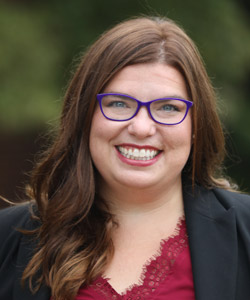 Tess L. Fosse, NIC, ADAC is currently the Director of University Disability Services (UDS) and the ADA Coordinator
at Bloomsburg University of Pennsylvania. In addition, she is also nationally certified
by the Registry of Interpreters for the Deaf (RID) as an American Sign Language (ASL)
Interpreter, and most recently received her ADA Coordinator Professional Certification
(ADAC) in August of 2021. She strives to improve access for all people at Bloomsburg
University by employing the principles of Universal Design and firmly believes that
education is an important responsibility of her role as Director and ADA Coordinator.
Tess L. Fosse, NIC, ADAC is currently the Director of University Disability Services (UDS) and the ADA Coordinator
at Bloomsburg University of Pennsylvania. In addition, she is also nationally certified
by the Registry of Interpreters for the Deaf (RID) as an American Sign Language (ASL)
Interpreter, and most recently received her ADA Coordinator Professional Certification
(ADAC) in August of 2021. She strives to improve access for all people at Bloomsburg
University by employing the principles of Universal Design and firmly believes that
education is an important responsibility of her role as Director and ADA Coordinator.
References:
Dolmage, J. (2018). Academic Ableism. [electronic resource]: Disability and Higher Education. University of Michigan Press.
Scheef, A., Cagniglia, C., & Barrio, B. L. (2020). Disability as Diversity: Perspectives of Institutions of Higher Education in the U.S. Journal of Postsecondary Education & Disability, 33(1), 49-61.